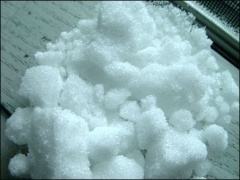Difference between revisions of "Camphor"
| Line 1: | Line 1: | ||
| − | {{ | + | {{Infobox_Machinery |
| image = Camphor-1.jpg | | image = Camphor-1.jpg | ||
| − | | origin = | + | | origin = <ul><li>Asia</li><li>India</li></ul> |
| − | | | + | | stowage factor = 1,30 / 1,90 m<sup>3</sup> /t (cases) |
| − | |||
| humidity and moisture = - | | humidity and moisture = - | ||
| ventilation = - | | ventilation = - | ||
| − | + | | risk factors = See text | |
| − | | risk factors = | ||
}} | }} | ||
| + | |||
==Description== | ==Description== | ||
Colourless or white crystals and granules with a very pungent and penetrating odour. Shipped in lined cases. | Colourless or white crystals and granules with a very pungent and penetrating odour. Shipped in lined cases. | ||
Revision as of 16:28, 30 October 2012
| Infobox on Camphor | |
|---|---|
| Example of Camphor |  |
| Facts | |
| Origin |
|
| Stowage factor (in m3/t) | 1,30 / 1,90 m3 /t (cases) |
| Humidity / moisture | - |
| Ventilation | - |
| Risk factors | See text |
Camphor
Contents
Description
Colourless or white crystals and granules with a very pungent and penetrating odour. Shipped in lined cases.
When heated evolves inflammable and explosive gases. Slowly volatilizes at ordinary temperatures. Cases should be weighed to ascertain loss due to evaporation.
Reference is made to the relevant IMO regulations on hazardous cargo.
Full information on this product is in the process of completion.











